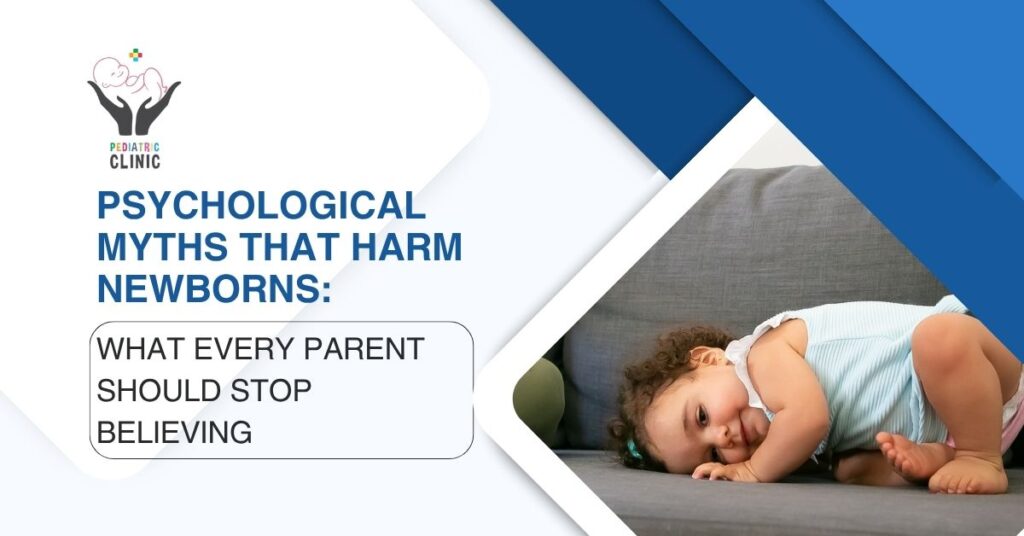Impact of Psychological Myths on Newborn Development
If not careful, parents might quietly pass psychological myths to the infants in the form of threats or warnings. These statements may go like, “Don’t cry, the ghost will come,” or whatever they think might work to calm the baby down. In other words, the parents consider these statements to be quite harmless, but in reality, such phrases can have negative consequences on the newborn’s mental-reservoir and emotional-reservoir capacity.
During early infancy, those prodigious outpourings of nerve impulse theaters of the brain, performing miracles of morphogenetic interchange, are really crafting themselves. Emotional safety and consistent communicative operation, or the development of a communication system, should be provided.
Psychological myths and fear-mongering statements can produce ill-humored, long-risk anxiety in a child and get in the parent’s way of building a good relationship with his child. These outdated parenting patterns can affect how newborns respond to emotional situations later in life.
How False Threats Influence Newborn Emotional Health
The cultural belief in the lying of fear-based parenting can have certain long-lasting impacts on a child’s emotional well-being. The go-to phrases inculcating fictitious fears or false dangers comprising ghosts, strangers, or animals would appear as something designed to get the child to stop their crying or control behavior on some level. Actually, they subvert the child’s burgeoning sense of security.
Newborns take in their environment through feelings of touch, tone, and smile. Seed fear during this phase, which eventually has more ill effects on emotional strength and promotes avoidance behaviors as the youngster develops. Early mental health grows in direct proportion with that sense of environment, safety, and comfort an infant feels.
Common Psychological Myths Parents Should Avoid
“Stop Crying or the Ghost Will Take You”
This is one of the most commonly used fear statements for newborns and toddlers. While the child may not understand the word ‘ghost,’ they respond to fearful tones and facial expressions. Repeating such threats fosters early fear responses and sleep disorders.
“Be Quiet or I’ll Call the Police”
This type of statement creates mistrust towards authority figures. A newborn begins to associate help with danger, which can lead to avoidance and fear of doctors, teachers, or even caregivers later in life.
“Should I Call the Dog to Scare You?”
Linking animals with fear disrupts the development of empathy in a child. These associations can lead to phobias, emotional disconnection, and behavioral challenges related to pets or animals in general.
“That Man Will Take You Away”
Statements that involve strangers or unknown people as threats can cause social anxiety. While safety is important, scaring newborns with such threats damages their sense of social trust.
“Everyone Is Laughing at You When You Cry”
Mocking or shaming a newborn for crying can build long-term emotional insecurity. It encourages emotional suppression rather than emotional expression, which is essential for psychological well-being.
Why Psychological Safety Matters from Day One
The mental health of a newborn is environment-dependent, and language forms one aspect of that environment. Newborns may not speak, but they are very much hearing the world around them through touch, voice, and expressions. When emotional threats and psychological myths start partnering up, that happy-sock space becomes a fearful one for the child.
Psychological safety means creating some trust from day one, using reassuring language, and being disarming about discomfort without threats. A secure environment allows the child to evolve in a stable emotional framework.
Positive Alternatives to Harmful Statements
- Instead of threatening, use calm reassurance: “You’re safe; I’m here.”
- Replace fear with connection: “Let’s calm down together.”
- Avoid labeling or mocking, and choose understanding: “It’s okay to cry. I’ll hold you until you feel better.”
These simple shifts in communication support better emotional development and long-term trust between parent and child.
Conclusion: Build a Future Without Fear for Your Newborn
Newborn care is not only about physical health — it includes emotional safety and mental support. By avoiding psychological myths and choosing emotionally intelligent responses, parents can raise confident, secure, and emotionally strong children.
To understand more about your child’s early development, visit Dr. Amandeep’s Pediatric Clinic in Greater Noida for professional newborn care and parenting guidance focused on physical and psychological wellness.
Looking for expert guidance on newborn emotional and psychological care?
Visit Pediatric Clinic in Greater Noida where newborn care goes beyond just physical health. Get trusted, compassionate support for your baby’s complete well-being from day one.
Book your consultation today and give your child a safe, confident start to life.



